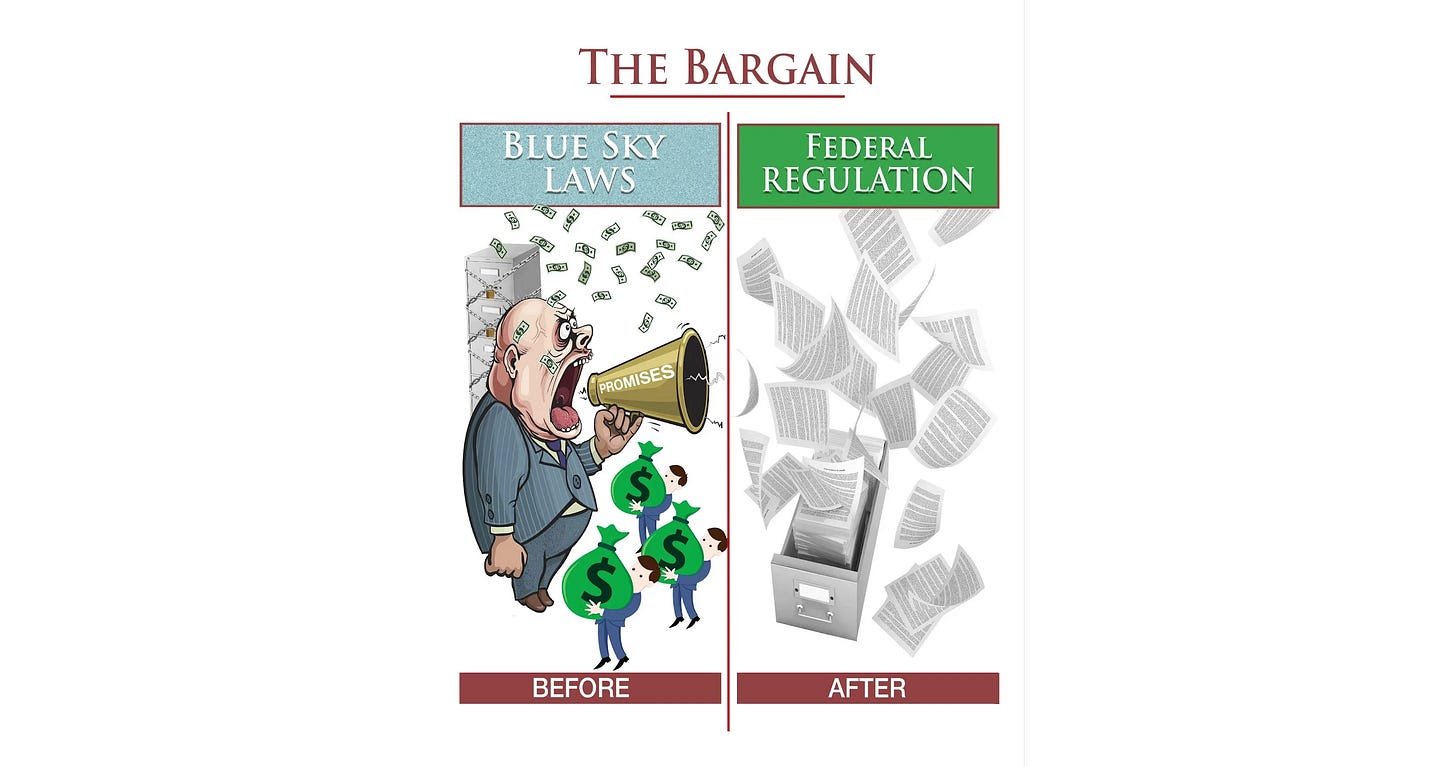Howey Doin?
Part IV - The Impetus for the Securities Laws
You are a member of a race of gamblers. The instinct to speculate dominates you. You feel that you simply must take a chance. You can’t win, yet you are going to speculate and to continue to speculate-and to lose. Lotteries, faro, roulette, and horse-race betting being illegal, you play the stock game.
This is how George Graham Rice, the “Jackal of Wall Street,” starts his foreword in My Adventures With Your Money. He is quite the character. Some facts from Wikipedia: He was born in Manhattan in 1870. When he was 20, he was convicted of stealing from his father's business to finance his gambling habits. When he was 25, he was convicted of forgery.
The foreword continues:
After years of experience behind the scenes, the conclusion is forced upon me that the instinct to speculate is so strong in American men and women that they choose to “take a chance” regardless of the fact that at the outset they already half-realize they eventually must lose.
Indeed, the instinct to speculate is also alive and well today.
Myself, in boyhood, a victim of the instinct to speculate, I, years afterward, at the age of 30, learned to cater to the insatiable desire in others.
Game, as they say, recognizes game. Did we mention that George Graham Rice is not even his real name? He was born Jacob Simon Herzig, he took the name from another inmate. The guy went to jail after he catered to people’s desires. It appears as though it was in prison when he took the time to write his book.
Are you aware that in catering to your instinct to “invest,” methods to get you to part with your money are so artfully and deftly applied by the highest that they deceive you completely?
So… For all you out there who wonder why we often put the word investing in quotation marks… Rice did the same 110 years ago. Why do you think that is? He is the caterer, all right. He recognized that speculators either didn't realize they were speculating, or they fancied themselves as an “investor.” So instead of acting on his own instinct, which he did when he was younger, he decided to make a living by satisfying the needs of others.
Clearly, we can’t call Rice an honest person. That said, this right here, is his come-to-Jesus moment. We would be doing ourselves a disservice if we did not listen to him:
The moral to the investor and speculator is “Never Again!” And yet you WILL speculate again. Experience teaches that so long as the chance of speculative gain exists in any enterprise, so long will the American public continue in its efforts to appease its speculative appetite.
Spot on, Jackal. We survived two World Wars, participated in several others, we’ve landed on the moon, we have electric cars and soon we may have the ability to live on Mars; all of this has happened since you uttered those words 110 years ago! The world has changed a great deal , but one thing hasn’t: the speculative appetite. Arguably, that desire has only become greater, and now, the shiny tool in the shed is crypto.
So what does this character have anything to do with the securities laws? Well, people like Rice are the reason why securities laws were adopted in the first place. In fact, Rice was considered the most successful and the most tireless stock swindler in the U.S. It’s no wonder that he had the honor of being cited by Congress during the congressional hearings which ultimately led to the adoption of the federal securities laws.
So what do these laws actually do? How would you explain it to a 10-year old?
Sure, we love visuals so here you go:
You might wonder why we call this image the Bargain. As SEC Chairman Gary Gensler explained:
Our core bargain from the 1930s is that investors get to decide which risks to take, as long as public companies provide full and fair disclosure and are truthful in those disclosures.
The person on the left with the megaphone is somebody like Rice, a promoter. They want to raise capital for a business. To attract capital, they are making certain promises to the public. On the other side, we have the public that is willing to risk their hard-earned money hoping to make more money. Good businesses with earning power, those that have good cash flows now, or are expected to have good cash flows in the future, will return more capital to the investors.
At the same time, the promoters have a tendency to keep the information locked down. Why? Because, they are not incentivized to be truthful. People respond to incentives. Knowing that the investing public’s incentive is to make money, their incentive is to be selective with the information so they can attract more of that money. If everything is out in the open, that would hinder their ability to raise capital. The best businesses will still attract capital and those that are not as good probably won’t. So it only makes sense that by keeping things in the dark it can aid in disguising that problem.
Information impacts cash flows and a full picture of cash flows, current and expected, are needed to make informed investment decisions. However, full and fair disclosure was just not going to happen by itself (despite the existence of the state laws existing at the time, which were called the Blue Sky laws); It needed to be enforced. Thus, Congress’ focus was on “sunlight,” which “is said to be the best of disinfectants.”
Let’s dive in some more.




